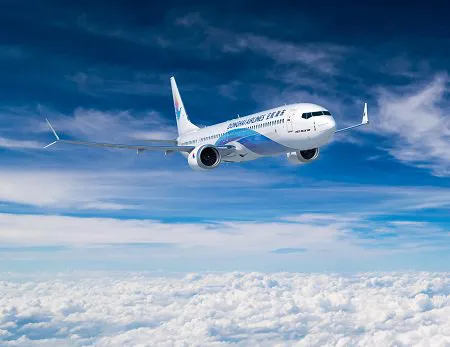
Donghai Airlines suspends pilot over toilet fight
Apr 06, 2021

Donghai Airlines has suspended a pilot following an altercation that occurred in the cockpit involving a dispute over restroom access. The incident reportedly escalated into a physical confrontation between the pilot and a co-pilot, raising concerns about professionalism and safety standards within the airline. The company has stated that it is conducting a thorough investigation into the matter to understand the circumstances surrounding the fight and to ensure that such behavior is not tolerated. The suspension reflects Donghai Airlines' commitment to maintaining a safe and respectful working environment for its crew members.
In a surprising turn of events, Donghai Airlines recently made headlines after suspending a pilot involved in a bizarre altercation over a toilet. This incident not only raised eyebrows but also sparked discussions about workplace conduct in the aviation industry. Understanding the implications of such incidents is crucial, especially when it comes to the reputation of airlines and their professionals. Let’s delve deeper into this unusual situation and its broader impact on the airline industry.
Incident Overview
The altercation reportedly occurred during a flight, where a disagreement over restroom access escalated into a physical confrontation. This incident has led to significant scrutiny of the airline's internal policies regarding employee conduct and conflict resolution. Donghai Airlines took swift action by suspending the pilot, emphasizing their commitment to maintaining a professional environment.
Impact on Donghai Airlines' Reputation
Such incidents can have a profound effect on an airline's reputation. Passengers often look for reliability, safety, and professionalism when choosing an airline. The toilet fight incident not only raises concerns about the crew's behavior but also questions the overall management practices in place at Donghai Airlines. A tarnished reputation can lead to decreased customer trust and loyalty.
Analyzing Workplace Conduct in Aviation
Workplace conduct, especially in high-stress environments like aviation, is crucial. Airlines must ensure that their employees are trained to handle conflicts professionally. The Donghai Airlines incident serves as a reminder of the importance of conflict resolution training and maintaining a harmonious work environment.
Preventative Measures and Policies
In light of this incident, it is essential for airlines to reassess their policies regarding workplace behavior. Implementing comprehensive training programs focusing on communication, conflict resolution, and stress management can significantly reduce the likelihood of similar incidents in the future. Here are some recommended measures:
| Measure | Description |
|---|---|
| Conflict Resolution Training | Provide training for all employees on how to effectively manage conflicts and communicate professionally. |
| Stress Management Programs | Implement programs that help employees manage stress, especially during high-pressure situations. |
| Clear Policies | Establish and communicate clear policies regarding workplace behavior and the consequences of unprofessional conduct. |
| Regular Workshops | Conduct workshops regularly to reinforce the importance of professionalism and teamwork among staff. |
Public Perception and Industry Reaction
The reaction from the public and industry professionals has been mixed. While some express outrage over the pilot's behavior, others are supportive of Donghai Airlines' decision to take action. Many believe that accountability is essential in maintaining high standards within the aviation sector. The incident has sparked conversations on social media, with various opinions being shared on platforms such as Twitter and Facebook.
Long-term Consequences for Donghai Airlines
In the long run, the repercussions of this incident may extend beyond the immediate suspension of the pilot. Donghai Airlines could face potential impacts on their recruitment efforts, as job seekers may become wary of the company's culture. Additionally, if public perception does not improve, there may be financial implications due to reduced passenger numbers.
Conclusion: Learning from the Incident
The toilet fight incident involving the Donghai Airlines pilot serves as a critical learning opportunity for the airline and the entire aviation industry. By adopting effective conflict resolution training and fostering a culture of professionalism, airlines can mitigate the risk of similar incidents occurring in the future. Ultimately, it is vital for airlines to prioritize employee conduct and ensure that their workforce reflects the values of safety and reliability that passengers expect.
As the industry evolves, maintaining high standards of professionalism will be essential for the success and sustainability of airlines worldwide. The lessons learned from this incident may serve as a catalyst for positive change in workplace culture across the aviation sector.
Related Articles

Explore Thailand: The Best Islands to Visit for Paradise, Adventure, and Relaxation

The Ultimate Guide to the Best Islands in Thailand for Your Next Getaway

Do babies need passports? How to get a passport for a newborn

How to get a U.S. passport fast: here’s how to expedite the process

What is Mobile Passport Control: 5 reasons why you should use it

SENTRI vs. Global Entry: A detailed guide

Do you need a passport to go to the Bahamas? Let’s find out

Do you need a passport to go to Mexico? A detailed guide

Do you need a passport to go to Canada? We got the answer

Do You Need a Passport for a Cruise: An Essential Travel Guide

Booster Seat Requirements: All the Rules to Follow in Your Rental Car

What Are the World’s Most Powerful Passports, and How Does Yours Rank?

How to Take a Passport Photo at Home: A Helpful Guide

You've got to have heart! Southwest's new livery

Your opinion: Should water be free on low cost carriers?

Young women bolder than guys as solo travellers
